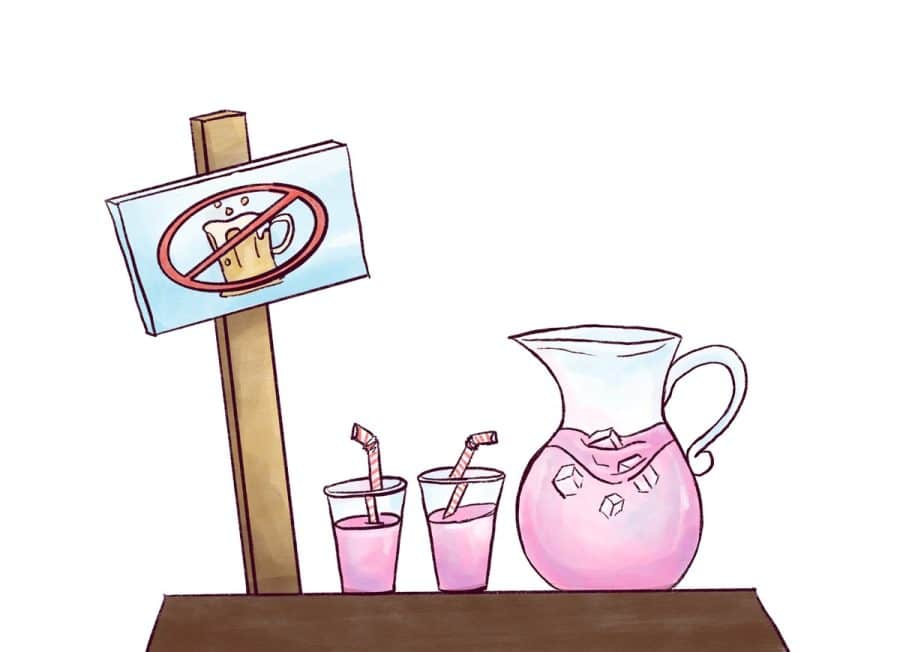Opinion | Abstaining from alcohol is better for you and for your studies
June 7, 2023
Editor’s Note (6/8/23): This story has been correctly updated to fix an error on alcohol taxes.
Drinking in moderation isn’t good for you, you don’t need to drink to have fun, and Prohibition wasn’t a failure.
For better or worse, The University of Alabama is known for its social life — not every university has a feature-length Max documentary about Greek life on campus. In 2023, the University was even declared the No. 4 party school in the United States by Niche.
Along with this bustling social scene comes a brisk trade in alcoholic beverages of every type. To be honest, it’s often pretty hard to go on a walk around Tuscaloosa without seeing discarded beer bottles and empty cans of hard seltzer.
For quite a few years now, it’s been a bit trendy to say a glass of wine a day keeps the doctor away. People claim that “it’s been scientifically proven!”
Of course, just like guaranteed returns on a new, limited-time investment, some things really are too good to be true. Recent research has concluded that even moderate drinking “may contribute to cancers of the breast, esophagus and head and neck, high blood pressure and a serious heart arrhythmia called atrial fibrillation.” Additionally, this meta-analysis, a study of prior studies, found no benefits from light drinking.
Canadian public health care officials have advised that “any reduction in alcohol use is beneficial” and “drinking alcohol, even a small amount, is damaging to everyone.” The guidance in the U.S. states that men need to restrict themselves to two or fewer drinks and women to one or fewer drinks each day.
The study, however, found that even drinking at the levels recommended by the U.S. government is associated with greater health risks, albeit not at statistically significant levels.
If consuming any quantity of alcohol is harmful, why is it still legal? The trite answer is we’ve tried to make people stop drinking and it didn’t go that well. In the popular consciousness, Prohibition is now that decade or so where everyone got too worked up about alcohol. It ended after it became clear their bold experiment had failed horribly.
Like most of what we learned in middle school history, that isn’t totally wrong, but it also isn’t the full story.
Under Prohibition, many Americans bought alcohol on the black market, setting the stage for crime lords like Al Capone. However, many problems attributed to alcohol by pro-Prohibition “drys” were in fact alleviated by the 18th Amendment. During Prohibition, “cirrhosis deaths fell by more than a third” and “domestic violence complaints fell by half,” historian David Courtwright writes in his 2019 book “The Age of Addiction.”
Due to the cultural perception of Prohibition as a failure, we have largely failed to address alcohol’s harms. The CDC has estimated that alcohol use will cause 140,000 unnecessary deaths this year. To stem this staggering cost of human life, we need to consider new, empathetic public policies.
We could follow Australia’s tobacco tax policy and significantly raise tax rates on alcoholic beverages.
By failing to disincentivize alcohol use with public policy, we have seemingly resigned ourselves to hundreds of thousands of lives needlessly lost. Moreover, temperance advocates have pointed out how alcohol harms democratic societies like the U.S. for centuries.
In a speech to the local Washington Temperance Society, a 33-year old Abraham Lincoln proclaimed temperance was a “noble ally … to the cause of political freedom” and would result in “a stronger bondage broken; a viler slavery, manumitted; a greater tyrant deposed” than in the American Revolution.
Lincoln, like many temperance advocates, viewed alcohol as a psychic poison afflicting people’s minds, depriving citizens of their “political and moral freedom.” He argued that you should avoid intoxication in order to properly confront reality with your human reason.
In addition to the threats alcohol poses to your physical health, and the moral arguments against intoxication, drinking can have substantial, adverse impacts on your education. One study from 2016 found that “the likelihood of being an A student decreased with each drink consumed.”
If you are paying tens of thousands of dollars to attend college, and likely paying even more to live in Tuscaloosa, why risk jeopardizing the very reason for this season of your life? A college education is supposed to leave you with the knowledge needed for a productive life, not just some great memories.
If you want to get the most out of your college experience, you should think twice before you start drinking. Billions of people across the world live incredibly happy, productive lives without alcohol.
Every college student needs to really reflect and consider if drinking is worth the myriad costs. Chances are, it isn’t.








